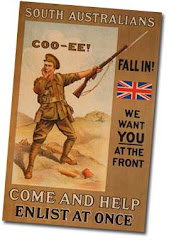Wesley Choat was one of seven sons of Joseph Choat and Alice Mary Choat (nee Broadbent) and was born at Cherry Gardens in 1895. His parents subsequently moved to Clarence Park and he attended Goodwod Primary School and worked as a farm labourer before the war.
Wesley enlisted alongside two of his brothers, Raymond Haddon and Archibald Percy in A or Ack Company of the 32nd Battalion on 12 July 1915. The three brothers were allocated sequential regimental numbers of 66, 67 and 68. The battalion embarked for training in the Middle East on 18 November 1915, arriving a month later. After a short stint in hospital, Wesley was charged for refusing to carry a box off a church parade. In June 1916 the battalion shipped to Marseilles and by train to the front.
On 19 July 1916 the inexperienced battalion was thrown into the poorly planned Battle of Fromelles, and along with many other members of the battalion, both of Wesley's brothers were killed. Wesley himself was wounded by shrapnel and captured by the Germans. It took three months for his family to receive news of his capture and internment in a prisoner of war camp in Dulmen, Germany. He attempted to escape in September 1917 but was caught. After he recovered from his punishment of six weeks imprisonment on bread and water, he escaped again in December along with another South Australian soldier, Lance Corporal James William Pitts, and they managed to make it to Holland (a neutral country in that war). They made it back to England a few weeks later.
Wesley's parents were extremely relieved to hear of his escape, and wrote to the Army asking that he be spared from the firing line given the death of his brothers. However, by the time their request reached England, the commander of Australian troops in England had already decided to send both back to Australia in recognition of their nearly 18 months of hardship in captivity and their successful escape.
Wesley and his fellow escapee were awarded the Military Medal for the courage they displayed in escaping from Germany. It appears he lived in Curramulka on the Yorke Peninsula for some time after the war, although he did live on Unley Road, Unley in the early 1920's.
Wesley died in 1977 aged 81 and was cremated at Centennial Park. His name is inscribed on honour boards in the Curramulka Uniting Church, Goodwood Primary School and Unley Town Hall.








No comments:
Post a Comment